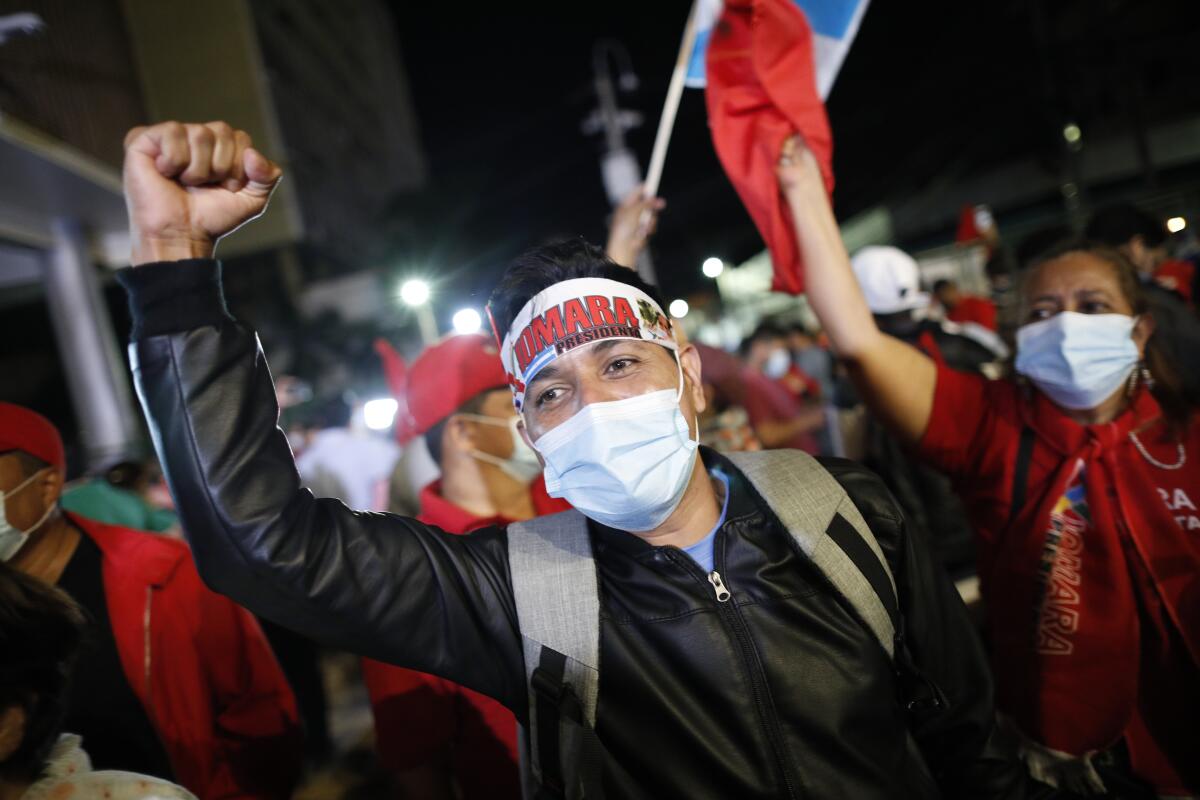Honduran Congress splits, threatens new president’s plans

- Share via
TEGUCIGALPA, Honduras — Honduran President-elect Xiomara Castro faced a growing crisis Sunday as dueling sessions of the newly elected Congress elected different sets of leaders, threatening Castro’s ability to carry out promised reforms.
The president is to be inaugurated Thursday and U.S. officials have hoped she could help battle poverty and insecurity in a country that is a major source of uncontrolled migration.
But a sizable bloc of deputies from her own Liberty and Refoundation party rebelled against her attempt to build a legislative majority by promising leadership of Congress to the allied party of her vice president. That split threatens to give control of the legislature back to the National and Liberal parties that had traded the presidency for generations.
With the conflict growing, hundreds of Castro’s supporters surrounded the legislative building overnight and the protests led one group of deputies to meet at a country club near the capital Sunday. There they confirmed the election of a dissident to lead Congress.
Officials say the Omicron variant has flooded the emergency room at Martin Luther King, Jr. Community Hospital, ground zero for hospitals besieged by a winter surge, with people who are not as sick.
While Jorge Cálix promised to back Castro’s policies, most of his support came from the conservative National Party of outgoing President Juan Orlando Hernández — who has been accused by U.S. federal prosecutors of involvement with drug smugglers.
Another group met at the Congress building in Tegucigalpa and elected Castro’s favored candidate, Luís Redondo. She quickly tweeted recognition of his selection and invited him to the inauguration.
Both groups claimed to have a majority.
The standoff also threatens her alliance with the Savior Party of Vice President Salvador Nasralla — Redondo is a member of it — and raised suspicions that the outgoing government is trying to scuttle her administration before it can start.
Political analyst Josué Murillo said the dissident legislators “are really pursuing their own private interests, whether it be a personal ego thing or an unbridled appetite for power,” and said the divided Congress could prove to be “a stone in the shoe” for Castro’s administration.
On Friday night Castro announced her party, known as Libre, was expelling 18 rebellious legislators. “These traitors who are singing like mermaids and say they are defending the will of the people, that’s a lie, it is not true,” Castro wrote.
The National Party quickly tried to take advantage, issuing a statement offering to take them in — something that would immediately give it the biggest delegation in Congress if it occurs.
The conflict alarmed U.S. diplomats in Honduras, who tweeted “a call on the political actors to maintain calm, establish dialogue, abstain from violence and provocative rhetoric.”
Castro’s party won 50 seats in the 128-seat Congress in November elections, so it needs allied parties — as well as all of its own votes — to pass legislation.
Political analyst and former presidential candidate Olban Valladares said the dispute could be the result of interference from the outgoing Hernández administration and made it doubtful that Castro would be able to count on the full support of her party to resolve Honduras’ problems.
Former President Manuel Zelaya, Castro’s husband, said via Twitter that the selection of Cálix would not be recognized and traitors would be expelled.
More to Read
Sign up for Essential California
The most important California stories and recommendations in your inbox every morning.
You may occasionally receive promotional content from the Los Angeles Times.











